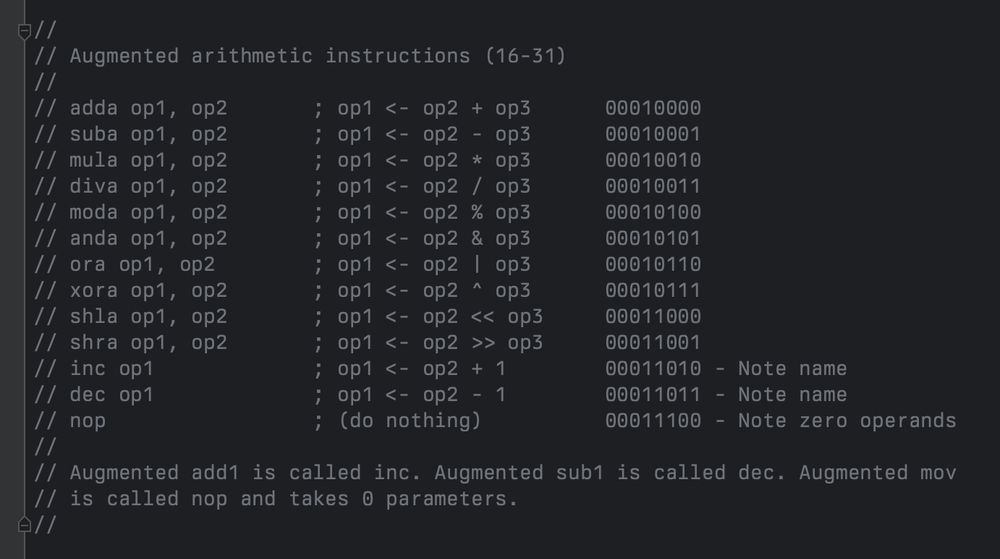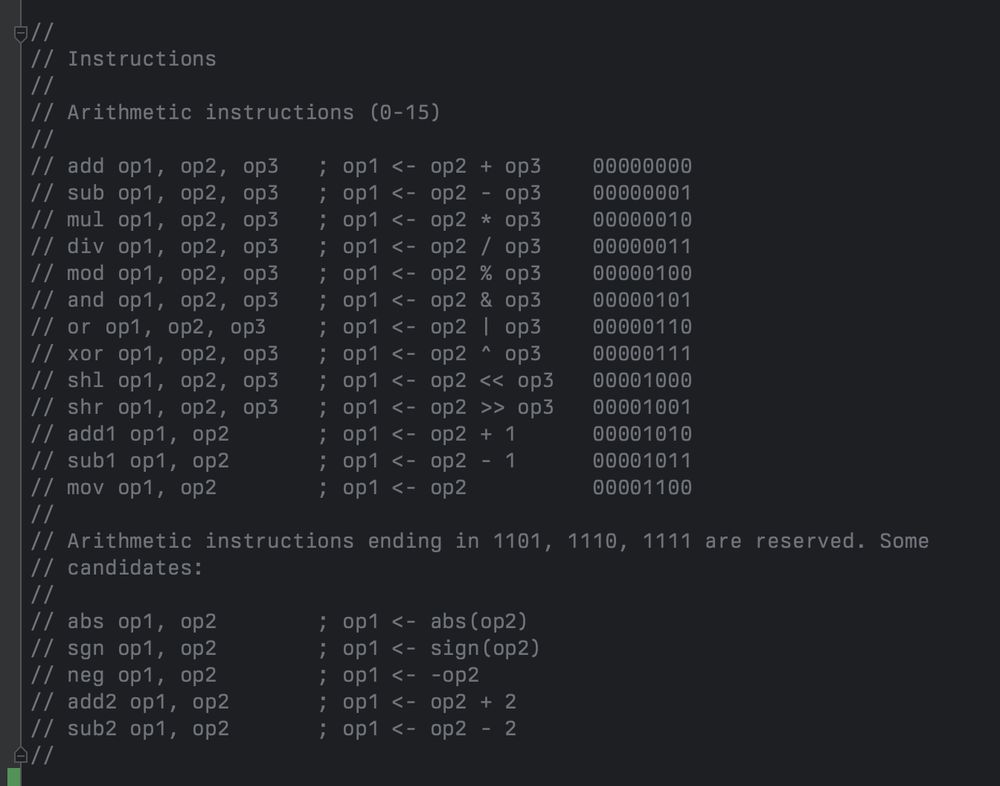I think subtle negative signals would be more useful than generally imagined, but textual medias rarely use them. TikTok can detect when people skip videos, but it’s harder in these Twitter clones
I think subtle negative signals would be more useful than generally imagined, but textual medias rarely use them. TikTok can detect when people skip videos, but it’s harder in these Twitter clones
![List of test instructions that ChatGPT wrote me.
export const opcodes: { [key: number]: string } = {
0b00000000: "add", // add <op1> <op2> <op3> - op1 <- op2 + op3
0b00000001: "sub", // sub <op1> <op2> <op3> - op1 <- op2 - op3
0b00000010: "mul", // mul <op1> <op2> <op3> - op1 <- op2 * op3
// etc, ending with 0b00001100: "mov"
0b00010000: "adda", // add <op1> <op2> - op1 <- op1 + op2
0b00010001: "suba", // sub <op1> <op2> - op1 <- op1 - op2
0b00010010: "mula", // mul <op1> <op2> - op1 <- op1 * op2
// etc, ending with 0b00011100: "nop"
0b11110000: "hlt", // hlt <?> <?> <?> - halt program execution
0b11110001: "hcf", // hcf <?> <?> <?> - halt and catch fire
}](https://cdn.bsky.app/img/feed_thumbnail/plain/did:plc:ih3rt6r3sesh2flndp7oefwc/bafkreigk2zydmtc4l3i6wylscfxi32i4miznksorfkn7imorfwcufcoptu@jpeg)



addai a, 1234 ; a: augmented assignment, b: immediate
addab a, 10 ; b: byte immediate
addai a, 1234 ; a: augmented assignment, b: immediate
addab a, 10 ; b: byte immediate

Note that mov is considered one of the arithmetic opcodes (it's similar in structure to e.g. neg, just does nothing)

Note that mov is considered one of the arithmetic opcodes (it's similar in structure to e.g. neg, just does nothing)
The 2002 (2004?) thing: nguillaumin.github.io/perihelion-m...
The 1994 thing can be found here: docs.dev-docs.org/htm/search.p...
The 2002 (2004?) thing: nguillaumin.github.io/perihelion-m...
The 1994 thing can be found here: docs.dev-docs.org/htm/search.p...
![// Write 8-bit unsigned byte `byte` to memory address `addr`, or `more` after
// that if provided
export function write8(addr: number, byte: number, ...more: Array<number>) {
if (byte < 0 || byte >= 256) {
error(`write8: byte doesn't fit ${byte}`)
}
if (addr < 0 || addr >= MEM_SIZE) {
error(`write8: invalid address ${addr}`)
}
mem[addr] = byte
if (more.length) {
for (let i = 0; i < more.length; i++) {
mem[addr + i + 1] = more[i]
}
}
}](https://cdn.bsky.app/img/feed_thumbnail/plain/did:plc:ih3rt6r3sesh2flndp7oefwc/bafkreigwow5jxuvzhnqcftrlk6zjzw6hsvsnmd7mwjr6ah7p6dgjpngedu@jpeg)


![export function step(): boolean {
let pc: number = registers.pc
log(`step: pc ${print(pc)}`)
let opcode: number = read8(pc++)
let instr: string = opcodes[opcode] ?? "nop"
let op1: number = read8(pc++)
let op2: number = read8(pc++)
let op3: number = read8(pc++)
registers.pc = pc
let op2value = readOperand(op2)
let op3value = readOperand(op3)
log(
`step: instr ${instr} ${print(opcode)} ${print(op1)} ${print(op2)} ${print(
op3,
)}`,
)
if (instr === "add") {
let result = op2value + op3value
writeOperand(op1, result)
return true
}
if (instr === "hlt") {
return false
}
if (instr === "hcf") {
error("Machine caught fire")
}
return true
}](https://cdn.bsky.app/img/feed_thumbnail/plain/did:plc:ih3rt6r3sesh2flndp7oefwc/bafkreib24n3wuh6irmidbqbswcvfmicmm5vpa74rmiojs5vhhkiqom4i3u@jpeg)

![export function read8s(addr: number) {
if (addr < 0 || addr >= MEM_SIZE) {
error(`read8: invalid address ${addr}`)
}
let result = mem[addr]
if ((result & 0b1000_0000) > 0) {
// Sign-extend
return result | 0xffffff00
} else {
return result
}
}](https://cdn.bsky.app/img/feed_thumbnail/plain/did:plc:ih3rt6r3sesh2flndp7oefwc/bafkreifpdwxj7ljuqbxswblyonloj4fulgmihqfkqbzog5nvkktbt4thsq@jpeg)


